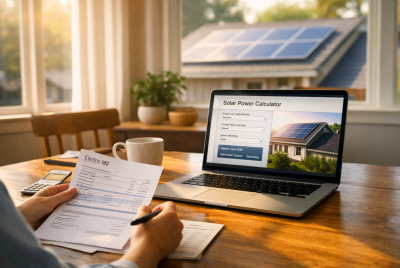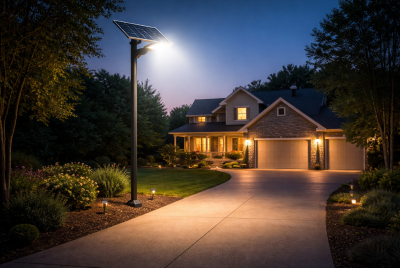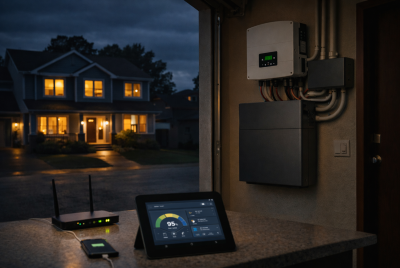Outdoor Solar Light Ideas: From Strings to Systems
When you’re tired of tripping over that dark step or wish your patio felt a little more “vacation,” outdoor solar lights are a small change with a big mood shift. In this friendly guide, you’ll learn practical, creative Outdoor Solar Light Ideas—from easy path markers to larger off-grid setups—plus how to choose brightness, color, and weather ratings that actually fit your space.
Affiliate note: I may earn from qualifying purchases at no extra cost to you.
Start With a Simple Lighting Plan
Before you buy anything, walk your yard at dusk. Where do you want a warm welcome (entry, path), a safety boost (stairs, driveway), or a little magic (trees, seating nooks)? Sketch quick zones and give each a job: guide feet, deter intruders, highlight plants, set the vibe. A small plan keeps you from buying five different styles that don’t “talk” to each other.
Quick planning tips
- Stick to one color temperature—ideally warm white—to keep everything looking unified.
- Place lights outside the walking line to reduce glare.
- Start with 3–5 fixtures, then expand once you love the feel.
Outdoor Solar Pathway Light Ideas
Pathway lights are the “hello there” of your home. Space them 6–8 feet apart for a dotted, gentle arc of light—more fireflies than runway. Use metal-and-glass stakes for longevity, or low-profile “pucks” for modern minimal paths.
Try this
- Curve paths: stagger lights on alternating sides for rhythm.
- Straight paths: symmetrical spacing for a formal look.
- Gravel or mulch: use taller stakes so light clears the surface.

Patio & Pergola: Solar String Light Ideas
Solar string lights turn any ordinary evening into café night—no outlet needed. Drape them along a pergola beam, zigzag across a patio, or trace a balcony rail. For renters, run a tensioned clothesline wire and clip lights so you avoid drilling.
Try this
- Create a triangle canopy with three anchor points for even spread.
- Mix globe bulbs over dining with fairy micro-strings in plants for depth.
- If windy, add additional hooks or zip ties to prevent sway noise.
Entryways, Walls & Stairs
Solar wall sconces and step lights blend style and safety. On stairs, mount lights at knee height or on risers to wash the tread with soft, glare-free light. For front doors, choose down-facing sconces (shielded) to avoid light spilling into neighbors’ windows at night.
Nice touch
- Warm white (≈2700–3000K) makes masonry and wood look richer.
- Match fixture finishes to door hardware for instant polish.
Motion-Sensor Security That Doesn’t Glare
You want “welcome” for you, “no thanks” for raccoons. Aim motion-sensor solar floods across the area (not into eyes) and at choke points: side gates, trash areas, and garage corners. Set a modest brightness and short timer—you’re signaling activity, not interrogating the backyard.
Solar Spotlights to Show Off Landscaping
A simple spotlight can make a small tree feel sculptural. Angle one light at 30–45° to graze bark or highlight a fountain, and use two lights on opposite sides for wide, soft coverage on larger plants. Hide fixtures behind shrubs for that “where’s the light even coming from?” effect.

Decks, Fences, Driveways & House Numbers
Deck cap lights outline edges for safety. Post-cap or fence lights give soft perimeter glow. For driveways, low bollards on the sides keep cars oriented without blinding exits. Don’t forget your house numbers—solar backlit plaques make deliveries easier and look surprisingly high-end.
Water, Ponds & Garden Features
Water multiplies light—so a little goes far. Choose IP67-rated floating discs for ponds or softly up-light a bubbler from the side. For birdbaths and planters, small stake lights tucked into foliage create layered shadows that feel natural and calm.
Off-Grid & Cabin-Ready Solar Lighting Systems
If you’re lighting a shed, pergola office, or remote cabin, step up from “single fixtures” to a small panel + battery kit that powers multiple lights. It’s still plug-and-play—but gives brighter, longer runtime and the option to add a motion sensor or USB charge port later.
Want to build out the panel piece smartly? Check out these budget-friendly solar panel options for a head start on sizing and picking dependable components.
Smarts & Specs: Brightness, Color, Weather & Batteries
Picking specs shouldn’t hurt your head. Here’s the quick tour:
- Brightness (lumens): 20–50 lm for markers, 50–150 lm for paths/steps, 300+ lm for security.
- Color temperature (CCT): 2700–3000K = cozy; 4000K+ = crisp/bright.
- Beam type: Flood for wide wash; spot for highlighting features.
- Weather rating (IP): IP65 handles heavy rain; IP67 survives temporary immersion.
- Batteries: Li-ion is common; LiFePO₄ lasts longer and handles heat well.
- Panels: Tilt toward the sun; keep them clean for full charge.
🧪 Research-Backed: What Experts Recommend
- Use efficient LEDs. The U.S. Department of Energy notes residential LEDs use at least 75% less energy and last up to 25× longer than incandescents—great news even when that power comes from a small solar battery.
- Choose warmer, shielded light outdoors. DarkSky guidance recommends 3000K or lower and well-shielded fixtures to reduce glare and protect human and wildlife health—useful when picking solar sconces and path light.
🔹 Top 5 Amazon Picks for Outdoor Solar Lights
Below are five well-loved models that map to common needs. (Aim them well, clean panels monthly, and you’re golden.)
1) Brightech Ambience Pro Solar String Lights (48 ft)
Cafe-style Edison bulbs on a durable cord; solar panel stakes or mounts. Great for patios and pergolas.
Features: 15 LED bulbs, ≈48 ft strand, auto dusk-to-dawn; panel rated for long charge life.
Pros: Charming ambiance, weather-resistant cord, easy setup.
Cons: Not task-bright; needs decent sun exposure.
Best for: Dining zones, balconies, renters.
Review snapshot: Praised for “instant vibe” and durability; occasional complaints about shorter runtime in winter.
2) Aootek 182-LED Solar Motion Sensor Lights
Bright, wide-angle motion floods with three modes (security, always-on, smart dim-to-bright).
Features: PIR sensor (≈120°, ~26 ft), multiple modes, high LED count.
Pros: Strong brightness for price; flexible modes.
Cons: Glare if aimed high; performance dips on consecutive cloudy days.
Best for: Side gates, garage corners, trash areas.
Review snapshot: Loved for brightness and detection; some report shorter lifespan with constant “always-on” mode.
3) Latband 36-LED Solar Spot Lights (4-Pack, IP68, Cool White)
Adjustable solar spotlights with 36 LEDs, three brightness modes, and a tough IP68 build—great for trees, facades, signs, and garden accents.
Features: 36 LEDs, 3 lighting modes (high/med/dim), auto dusk-to-dawn, 270° adjustable head/panel, polycrystalline panel touted up to ~25% conversion, rated to work from about −4°F to 140°F; stake in ground or wall-mount.
Pros: Bright output for accents; flexible aiming; higher weather rating than many budget spots.
Cons: Cool-white only (no warm option); runtime depends on daily sun; plastic housing.
Best for: Uplighting small trees, sign walls, architectural details where you want a crisp, cool-white look.
Review snapshot: Common praise centers on brightness and easy setup; typical cautions are shorter winter runtimes and the cool-white color being less “cozy.”
4) Greluna Solar Wall/Fence Lights (2-Mode, 8-Pack)
Compact fixtures switch between warm white and color-changing—fun for fences and stairs.
Features: Two color modes, fence/deck/stair mounts, multi-pack value.
Pros: Simple install, playful color option, tidy size.
Cons: Decorative more than bright; small panels need good sun.
Best for: Fence lines, stair markers, festive accents.
Review snapshot: Fans love the warm glow and value; some note color mode drains faster.
5) BEAU JARDIN High-Lumen Solar Pathway Lights (8-Pack)
Metal-and-glass path lights with a classic look and bright, patterned beam on the ground.
Features: Stainless steel bodies, glass lenses, quick stake install.
Pros: Sturdy build; attractive light pattern; easy assembly.
Cons: Taller profile can tilt in very soft soil—firm up with gravel or sleeves.
Best for: Front walkways, garden borders, formal paths.
Review snapshot: Frequently praised for “lux” appearance and brightness; occasional reports of one or two units fading sooner than others.
Comparison at a Glance
| Model | Key Spec(s) | Warranty | Approx Price/Tier | Best For |
| Brightech Ambience Pro (48 ft) | 15 LED Edison, dusk-to-dawn | Varies by seller | $$ (mid) | Patios, pergolas, balconies |
| Aootek 182-LED Motion | PIR sensor, 3 modes, wide angle | Varies by seller | $ (budget) | Side gates, garages |
| Latband 36-LED Solar Spot Lights (4-Pack) | 36 LEDs, 3 modes, IP68, 270° adjustable | Varies by seller | $–$$ | Trees, facades, garden accents |
| Greluna Wall/Fence (8-pack) | Warm white & color mode | Varies by seller | $ (budget) | Fences, stairs |
| BEAU JARDIN Pathway (8-pack) | Metal/glass, high lumen | Varies by seller | $$ (mid) | Walkways, borders |

Small Spaces: Balconies, Porches & Rent-Friendly Setups
No yard? No problem. Clip micro-strings on a balcony rail, stand a solar lantern in a plant pot, and use adhesive pads for mini step lights (remove with a hairdryer when you move). One strong spotlight grazing a potted olive tree can look as chic as a whole backyard.
Budget vs. Premium: Where to Spend (and Save)
Spend on: better materials (metal/glass), stronger panels for shady yards, and motion floods you’ll rely on nightly.
Save on: decorative accents you’ll swap seasonally or lights used just a few nights a month.
Common Mistakes (and Easy Fixes)
- Too cool/blue light that feels stark. Fix: choose warm white (≈2700–3000K).
- Blinding angles. Fix: aim across the area, not at eye level.
- Random styles everywhere. Fix: pick one finish and one CCT for cohesion.
- Shaded panels. Fix: remote-mount the panel where sun is best.
FAQs
How many lumens do I need for outdoor solar path lights?
Aim for 50–150 lumens per fixture for clear guidance without glare. Lower (20–50 lm) works for purely decorative dots; higher for wide or dark paths.
Are solar-powered lights sufficient for home security?
Yes—choose motion-sensor flood styles (≈300+ lumens) and aim them across entry points. Use a short timer to conserve battery and avoid harsh glare.
Do solar-powered lights function in cold, cloudy weather?
They’ll run shorter on low-sun days. Prioritize bigger panels, place them in full sun, clean them monthly, and use lower-brightness modes in winter.
What’s the best color temperature outside?
Warm white (≈2700–3000K) is cozy and recommended by light-pollution advocates for comfort and ecology. Cooler temps can feel clinical and attract more bugs.
How many years can you expect outdoor solar fixtures to last?
LEDs can last many years; batteries are the consumable. Expect 1–3 years from common Li-ion cells; longer with LiFePO₄. You can usually replace batteries when runtimes shorten.
Conclusion
Thoughtful outdoor solar lighting is less about “more fixtures” and more about purpose + placement. Start with a small plan, keep your color warm and consistent, and mix a few hardworking pieces (motion floods, step lights) with mood-setters (strings, spotlights). With the right choices, you’ll spend more evenings outside—safe, relaxed, and proud of how your home greets the night.




